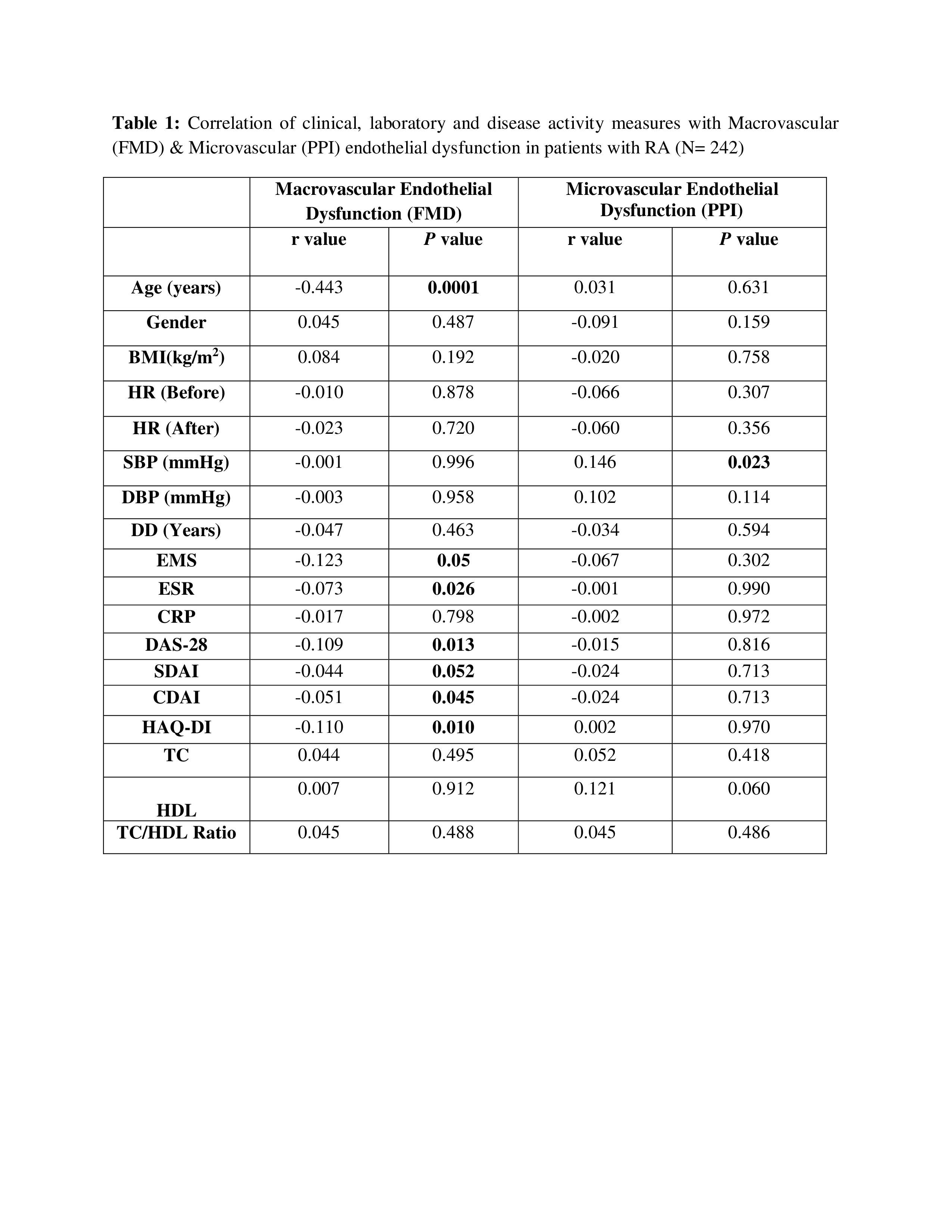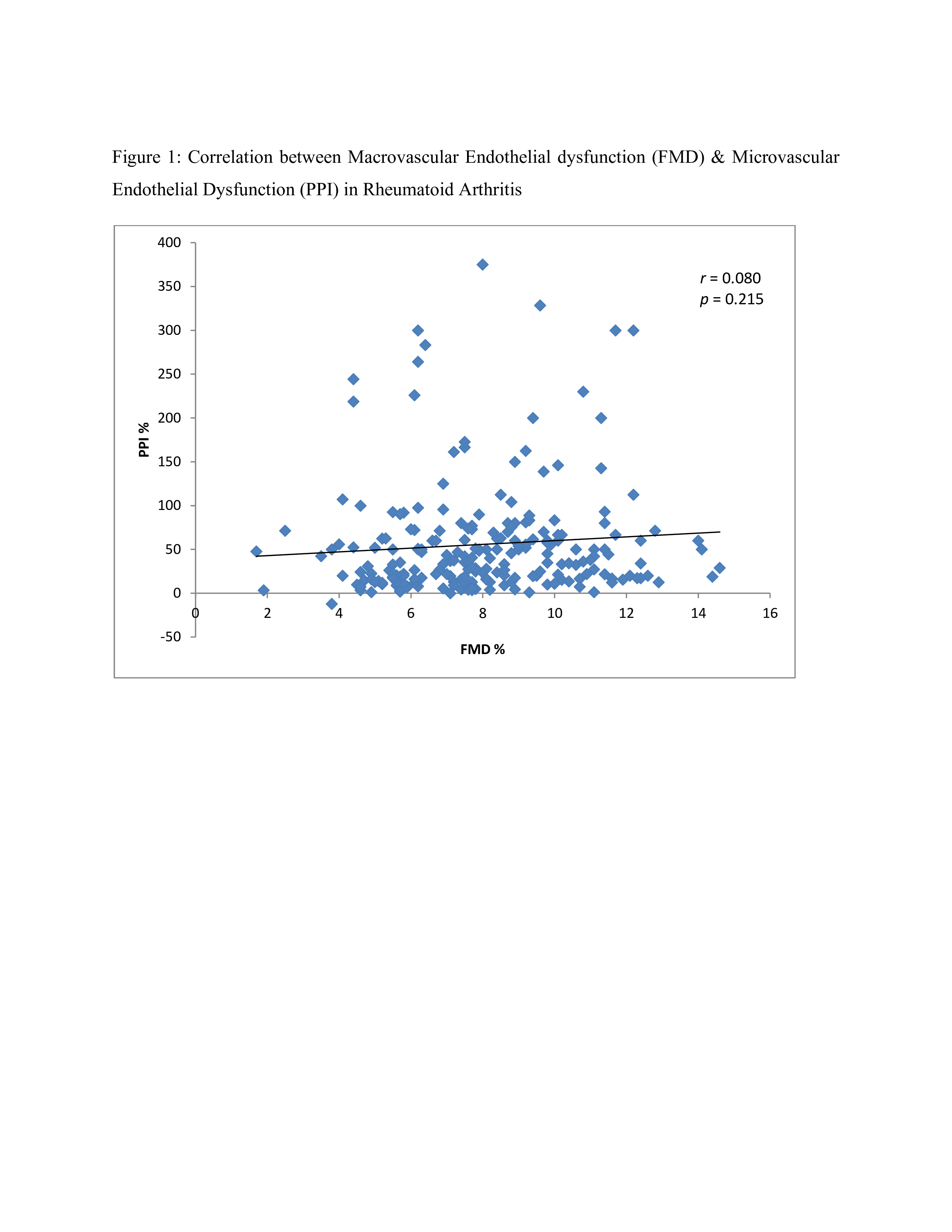Session Information
Session Type: Poster Session C
Session Time: 10:30AM-12:30PM
Background/Purpose: RA is a chronic inflammatory disease associated with an excessive premature cardiovascular morbidity and mortality. Endothelial dysfunction is a significant contributor to CVD in RA patients, affecting both microvascular and macrovascular systems. Studying the correlation between microvascular and macrovascular endothelial dysfunction is crucial as macrovascular endothelial dysfunction predicts cardiovascular events in pre-existing atherosclerosis patients, while microvascular function predicts cardiovascular events in patients without vascular pathology1. However, the relationship between microvascular and macrovascular endothelial dysfunction needs exploration.
Objectives:To investigate the correlation between Microvascular and Macrovascular Endothelial Dysfunction in Rheumatoid Arthritis.
Methods: 242 consecutive RA patients (216 females, 26 males; mean age: 54±11, years; range:25 to 82 years) meeting ACR/EULAR 2010 Rheumatoid Arthritis classification criteria on stable doses of cDMARDs swere enrolled. Macrovascular endothelial function was assessed using flow mediated dilation (FMD) at brachial artery using AngioDefender. The Peripheral Perfusion Index (PPI) using Pulse oximeter was used to assess microvascular endothelial function, assessing before and after reactive hyperemia and during periods of Nitric Oxide (NO) vasodilation, and every 15 seconds for 5 minutes.
The variation in the PPI was calculated at each assessed time point using the following formula:
ΔPPI: PPI time − PPI basal/PPI basal (×100)
The relationship between FMD and PPI values was analyzed using Pearson correlation coefficients using graph pad prism3 software.
Results: Research indicates that RA patients exhibit significant endothelial dysfunction in macrovascular compartments and no correlation in microvascular compartments(Table: 1). There was positive correlation (r= -0.109, p= 0.013) observed between FMD values and disease activity scores in macrovascular endothelial dysfunction in RA patients. No statistically significant correlation (r = 0.080, p =0.215) was found between FMD and PPI values, suggesting that microvascular and macrovascular endothelial dysfunctions are not closely related in RA (Fig: 1).
Conclusion: No correlation was observed between microvascular endothelial dysfunction (PPI) and macrovascular endothelial dysfunction (FMD) in patients with Rheumatoid Arthritis suggesting different underlying pathogenic mechanisms.Understanding this relationship is crucial for developing targeted therapeutic strategies aimed at mitigating cardiovascular risk in RA patients. Further research should explore the underlying mechanisms, predictors and potential interventions to address endothelial dysfunction in this population.
To cite this abstract in AMA style:
Sabharwal V. Microvascular and Macrovascular Endothelial Dysfunction in Rheumatoid Arthritis [abstract]. Arthritis Rheumatol. 2024; 76 (suppl 9). https://acrabstracts.org/abstract/microvascular-and-macrovascular-endothelial-dysfunction-in-rheumatoid-arthritis/. Accessed .« Back to ACR Convergence 2024
ACR Meeting Abstracts - https://acrabstracts.org/abstract/microvascular-and-macrovascular-endothelial-dysfunction-in-rheumatoid-arthritis/


